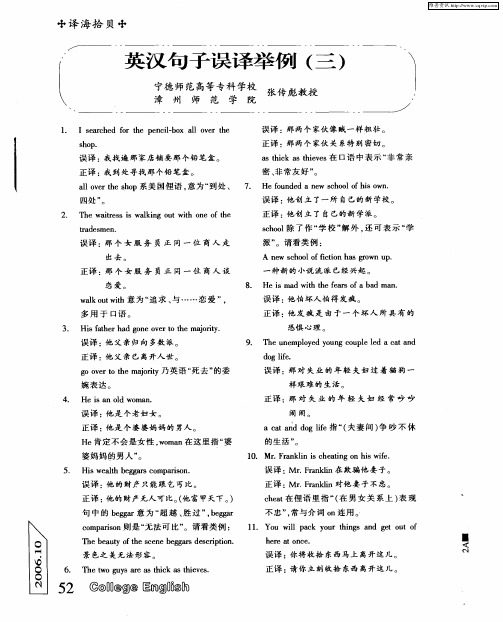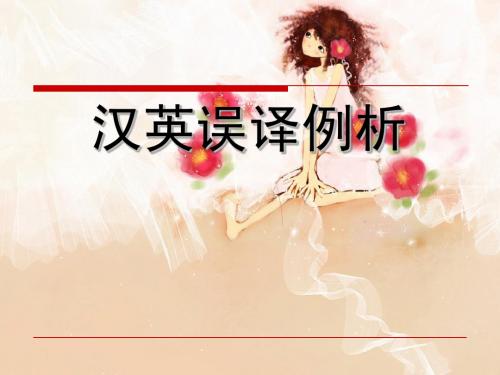汉译英误译举例
- 格式:pdf
- 大小:263.40 KB
- 文档页数:23

汉译英典型误例分析一选词不当E.g. 1 她拒绝对这件事发表意见。
She refused to express her opinion on this matter. (She refused to comment on the matter.)E.g. 2 这些工人省吃俭用,为的是为国家多积累资金。
These workers save food and expenses toaccumulate more funds for the country. (These workers live frugally to accumulate more funds for the country.)E.g. 3 在揭露社会罪恶的同时,这本小说的攻击目标是那些学者阶层。
作者要求人们将党的团结置于小派别的争吵之上。
While exposing the social evils, the main attack in this novel is directed against the literati. Andthe author of this novel begs people to set party unity above the bickering of wings.(splinter groups) For Discussion你能介绍一本好书给我吗?Could you introduce me a good book?今年春天由党中央召开的全国科学大会,动员全国人民为祖国的科学、技术现代化而努力。
The National Science Conference convened this spring by the Party Central Committee sparked off the entire nation to dig in towards the modernization of science and technology.即使商品质量好,也不能漫天讨价。


文学文化误译的案例一、成语类。
1. “胸有成竹”误译:There is a bamboo in the chest.正确的意思是在做事之前已经有了通盘的考虑。
比较好的翻译是“Have a well thought out plan before doing something”或者“Have a preconceived idea at heart”。
这种误译就很滑稽,按照字面直接翻译完全失去了成语的内涵,让人摸不着头脑,以为是身体里真有竹子呢。
2. “人山人海”误译:People mountain, people sea.虽然这种翻译很有画面感,但这是典型的中式英语。
正确的翻译应该是“a sea of people”或者“huge crowds of people”,“People mountain, people sea”这种翻译外国人是很难理解其确切含义的,就像在说奇怪的地理构造一样。
二、文学作品中的意象类。
2. 在翻译中国古诗中的“月”这一意象时。
三、文化习俗类。
1. “红白喜事”误译:Red and white happy events.在中国文化里,“红喜事”指结婚等喜庆之事,“白喜事”是指高寿的人去世的丧事(因为高寿者去世被视为一种自然的解脱,也带有一定的喜庆成分)。
这种误译没有传达出其中的文化习俗含义。
比较合适的翻译可以是“Weddings and funerals for the elderly”。
2. “吃豆腐”(有占人便宜的意思)误译:Eat tofu.如果这样直接翻译,外国人只会理解为字面意义上的吃豆腐这种食物的动作。
而不知道在汉语口语中,“吃豆腐”还有特殊的文化含义。
要准确传达这个意思可能需要解释性的翻译,比如“Take undue advantage of someone”。


生活中英语标识语的误译与分析随着中国与国际社会的交流日益加深,越来越多的英语标识语进入了我们的生活。
这些标识语通常出现在商店、餐厅、景点等场所,用来指导或提醒顾客。
由于翻译的不准确或者不恰当,有时候这些标识语的意思被误解,甚至是荒谬可笑的。
下面我们就来看一看生活中英语标识语的误译,并进行分析。
误译1: "洗手间" 翻译为 "Hand-washing Room"这是一个非常常见的误译。
在中国,我们通常把厕所叫做 "洗手间",因为我们认为厕所里不仅可以方便解决大小便问题,还可以进行洗手之类的卫生活动。
英文中的"Hand-washing Room" 通常指的是专门用来洗手的房间,而不是厕所。
这个误译可能会导致外国人误以为这个房间只能用来洗手,而不是方便解决大小便问题。
分析:这个误译的原因可能是由于对英文单词的理解不够准确。
在翻译时,应该考虑到英文和中文在描述卫生设施时的习惯用语的不同,尽量选择更贴近实际用途的词语进行翻译。
这是一个很常见的误译。
在中国,我们通常将 "禁止吸烟" 翻译成 "No Smoking",但实际上 "No Smoking" 的意思是 "不要抽烟",而不是 "禁止吸烟"。
这两者的语气不同,翻译成 "No Smoking" 会显得比较礼貌,可能导致一些人误解为只是提醒不要抽烟,而不是完全禁止。
分析:这个误译可能是因为直译了中文的意思,而没有考虑到在英语中表达禁止的更严厉的语气。
在翻译时应该根据情况选择更符合原意的表达方式。
误译4: "禁止随地吐痰" 翻译为 "No spitting"在中国,我们常常用 "禁止随地吐痰" 来提醒人们不要在公共场合随地吐痰。

汉译英的十一大误译1 永远记住你 remember you forever 不对,因为没有人能活到forever ,而应该是always remember you。
2 黄头发不是yellow hair,而应该是blond/blonde,西方人没有yellow hair的说法。
3 厕所绝对不是WC 或者toilet,这些是马桶和茅坑的说法,假想一下,你对老外说,不好意思,请问茅坑在哪里?你说话是不是过于洒脱,尺度太大了?正解应该是men's room/women's room/restroom/powder room等。
4 还有些很过时的已经可以入土的说法,比如真遗憾不要再用 it's a pity ,用that's too bad/it's a shame更流行些,还有裤子不要用trousers了,而是pants/slacks/jeans。
马马虎虎最好用average/fair/all right/not too bad/OK(西方人很少使用so-so),提到好吃不要只能反应出一个单词,就是delicious,可以多用用yummy/nice/tasty/appetizing等。
5 还有些在国外只有小孩子才用的过于孩子气的说法也应该避免使用,比如再见用bye-bye 不好,直接用bye/see you/see you later/later比较合适。
再比如面条,少用孩子气的noodles,而最好用pasta。
6 一些公共场合的用语也是同学最不会翻译的,比如“小心台阶”被翻成“pay attention to the steps”而非正确的“mind the steps”。
再比如姚明如果去你家作客,应该说“mind your head”才对。
7 再比如这一系列的句子:我感到很痛不是I am painful.而应该是I feel great pain.注意,“我感到高兴”是 I am happy,“我感到累了”是 I'm tired,但“我感到很痛”却不是 I am painful。
翻译易错的50个例子1. cabinet photograph例句:Is the cabinet photograph well taken?误译:这张全体内阁成员的合影拍得好吗?原意:这张六英寸照片拍得好吗?说明:cabinet photograph (合成名词) 是"六英寸照片"之意。
2. cakes and ale例句:She fully enjoyed cakes and ale。
误译:她充分地享用了蛋糕和啤酒。
原意:她尽享了人生乐趣。
说明:cakes and ale 意为"人生乐趣(事)". (此语出自莎士比亚著作Twelfth Night<<第十二夜>>)。
3. call例句:He has no call to flare up。
误译:他没有发怒大叫。
原意:他没有必要发怒。
说明:本例的call (名词),意为"必要","理由". 作此解时一般用于否定句和疑问句。
4. call one names例句:My grandpa told me not to call him names。
误译:我爷爷告诉我不要叫他的名字。
原意:我爷爷叫我不要骂他。
说明:call one names 意为"辱骂某人",用于口语. 值得注意的是,one一定要用宾格,而不是所有格,即不是one's."names" 一定是复数"names", 否则就不是此意. 如上例,若该成Mygrandpa told me notto callhis name. 则是"我爷爷叫我不要叫他的名字". call one's name中的name根据情况,可用单数和复数。
5. can例句:Buy up all the pineapples! We can can them。
11.他每天负责邮件投递【误译】He is in charge of delivering mails every day. 【点评】略【改译】His job is to deliver mails every day.12. 我把那整本书看了一遍。
【误译】I've read through the whole book.【点评】略【改译】I've looked/read through the book.14. 爱护草地,请勿入内【误译】T ake care of the grass, please do not enter. 【点评】略【改译】Keep off the grass.19. 护士量了我的体温。
【误译】The nurse measured my temperature.【点评】略【改译】The nurse took my temperature.29. 我们需要的是最新信息。
【误译】What we need is the newest information. 【点评】略【改译】What we need is the latest information.35.这个橱子占了太大的地方。
【误译】This wardrobe takes up too much place.【点评】略【改译】This wardrobe takes up too much room.36.你身上带钱了吗?【误译】Do you carry any money with you?【点评】略【改译】Do you have any money on you?37.不准拍照【误译】Don't take pictures!【点评】略【改译】No photographs.66.他装作没注意到我。
【误译】He desguised not to notice me.【点评】略【改译】He pretended not to notice me.68.他非常非常想念你。
汉译英误译及更改50例1. 我不怕冷。
误译:I’m not afraid of coldness.正译:I don’t mind the cold weather.Cf. 他不怕吃苦。
误译:He doesn’t fear hardships.正译:He can bear hardships.他能吃能睡。
误译:He can eat and he can sleep.正译:He is a big eater and a sound sleeper.2. 我知道那座小镇,但从未去过那里。
误译:I know the small town but I’ve never been there.正译:I know of the small town but I’ve never been there.3. 过度饮酒会损害你的身体。
误译:Over-drinking may injure your body.正译:Over-drinking may injure your health.4. 杰克,我用车子送你回家。
误译:Jack, I’ll send you home in my car.正译:Jack, I’ll take / run you home in my car.5. 我们希望你马上戒烟。
误译:We hope you to stop smoking right now.正译:We hope that you stop smoking right now.6. 经济形式将会变好。
误译:The economic situation will change better.正译:The economic situation will change for the better.7. 箱子里面是空的。
误译:The inside of the box is empty.正译:The box is empty.8. 请把窗帘打开。
汉译英误译举例摘自《汉英翻译技巧》(单其昌)1.他一点不蠢。
误:He is not a fool.正:He is no fool.2.我对他们一个也不喜欢。
误:I do not like all of them(every one of them).正:I do not like any of them.(I like none of them).3.我不会做那样的蠢事。
误:I know better than do such a thing.正:I know better than to do such a thin.4.我是去读书,不是去打篮球。
误:I went to study,not play basketball.正:I went to study,not to play basketball.5.我们没有准时达到,感到很抱歉。
误:We felt sorry for coming not on time.正:We felt sorry for not coming on time.6.这个伟大胜利是来之不易的。
误:This great victory has been won not easily.正:This great victory has not been won easily.7.绝无此类事发生。
误:There is no such a thing.正:There is no such thing.8.在河两边一棵树也没有。
误:There is not a tree on both sides of the river.正:There is not a tree on each side of the river(on either side of the river).9.两种说法都不真实。
误:Both stories are not true.(None of the two stories is true.)正:Neither story is true.10.这两本小说我都不喜欢。
误:I don’t like both of the novels.正:I like neither of the novels.(I do not like either of the novels.)11.无论哪一种情况,我都不同意。
误:I don’t agree in both cases.正:In neither case can I agree.12.谁都不说英语。
误:Every one doesn’t speak English正:No one speaks English.(None of them speak English.)13.到处找不到他。
误:He is not found everywhere正:He is nowhere to be found.14.谁都不能做那事。
误:Anybody can not do it.(All of them can not do it.)正:Nobody(no one)can do it.15.你不能做那事,我也不能,任何人都不能。
误:You can’t do it,neither can I,neither can anybody else.正:You can’t do it,nor can I,nor(neither)can anybody else.16.我也不去。
误:I shall not go too.(I shall not go also.)正:I shall not go either.(I shall go neither.)17.我不喜欢打篮球,更不喜欢踢足球。
误:I don’t like playing basketball,much more play football.正:I don’t like playing basketball,much less playing football.18.虽说不上热,但也够暖和了。
误:It is warm,to say nothing of hot.正:It is warm,not to say hot.19.没有人没有缺点。
误:(There is)nobody but hasn’t his faults.正:Nobody but has his faults.20.他除读了一篇短篇小说外,什么也没干。
误:He did nothing in addition to reading a short story.正:He did nothing except(beyond,but)reading a short story.21.他非常不喜欢她。
误:He does not like her very much.正:Not a bit does he like her.正:He simply does not like her.正:He does not like her at all.22.我们现在得走吗?——不,现在不必走误:Must we go now?—no,you mustn’t.正:Must we go now?—no,you needn’t.23.不,那不可能是她。
误:No,it mustn’t be her.正:No,it cannot be her.24.我没有多少牛奶了。
误:I haven’t plenty of milk left.正:I haven’t much milk left.25.你看,他工作是多么不努力啊!误:Now,you see,how hard-working he isn’t!正:Now,you see,how slack he is!26.你的表不对。
误:Your watch is not right(correct).正:Your watch doesn’t keep good time.27.他们是我们的死敌。
误:They are our dead enemies.正:They are our deadly enemies.(Or:mortal enemies,sworn enemies)28.这衣服是毛线衣。
误:The dress is woolen.正:This is a woolen dress.29.形势是最好不过的了。
误:The situation is nothing else but bad.正:The situation is nothing else but fine.30.那完全是一个奇迹。
误:That’s nothing more than a miracle.正:That’s nothing less than a m iracle.31.他决不是勇敢的人。
误:He is anything but not a brave man.正:He is anything but brave.32.他自以为了不起。
误:He thinks himself anything.正:He thinks himself something.33.他骄傲得不得了。
误:He is proud like something.正:He is proud as anything.34.我是在北京见到他的。
误:It was in Beijing where I saw him there.正:It was in Beijing that I saw him.35.简直可以说他是一个无赖。
误:He is,like it was,a scamp.正:He is,as it were,a scamp.36.他就是大家所称的伟大领袖。
误:He is the“so-called”great leader.正:He is what is called the great leader.37.他不久前,就是说8月1日,到上海去了。
误:He went to Shanghai not long ago,that was to say,on August.正:He went to Shanghai not long ago,that is,on August.38.他是一个教师,不是一个工人。
误:He is a teacher,but not a worker.正:He is a teacher,and not a worker.(He is not a worker but a teacher./He is a teacher,not a worker.)39.看来与其说他老实,不如说他聪明。
误:He seems to be clever or rather than honest.正:He seems to be clever rather than honest.40.那与其说是一首诗,倒不如说是一幅画。
误:It is even more a picture rather than a poem.正:It is even more a picture than a poem.(It is a picture rather than a poem.)41.他吃惊不大,倒很生气。
误:He was angrier than frightened.正:He was more angry than frightened.42.与其说他分裂我们的队伍,倒不如说他在团结我们。
误:He does not so much sp l it our ranks than he unite them.正:He does not so much split our ranks as unite them.43.你可永远不能这么说!误:You never say so!正:You must never say so!44.我关上门好不好?——噢,请吧。
误:Do you mind my shutting the door?—oh,no,please don’t.正:Do you mind my shutting the door?—oh,no,please.45.我们一块儿学习英语吧。
误:Suppose we shall study English together.正:Suppose we study(studied)English together.46.啊,他要是还活着该多好!误:Ah,if only he is alive!正:Ah,if only he were alive!(Or:Oh that he were alive!)47.他多懒啊!误:Is he lazy!正:Isn’t he lazy!48.他是个什么样的人(外表)?误:What is he?正:What is he like?49.我问她第二天他去不去上海。